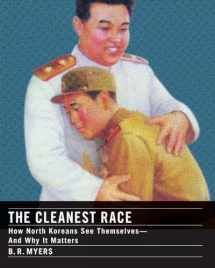
The Cleanest Race: How North Koreans See Themselves and Why It Matters
ISBN-13:
9781933633916
ISBN-10:
1933633913
Edition:
First Edition
Author:
B. R. Myers
Publication date:
2010
Publisher:
Melville House
Format:
Hardcover
208 pages
FREE US shipping
Book details
ISBN-13:
9781933633916
ISBN-10:
1933633913
Edition:
First Edition
Author:
B. R. Myers
Publication date:
2010
Publisher:
Melville House
Format:
Hardcover
208 pages
Summary
The Cleanest Race: How North Koreans See Themselves and Why It Matters (ISBN-13: 9781933633916 and ISBN-10: 1933633913), written by authors
B. R. Myers, was published by Melville House in 2010.
With an overall rating of 4.4 stars, it's a notable title among other
Social Psychology & Interactions
(Psychology & Counseling, Social Psychology & Interactions, Psychology, Customs & Traditions, Social Sciences) books. You can easily purchase or rent The Cleanest Race: How North Koreans See Themselves and Why It Matters (Hardcover) from BooksRun,
along with many other new and used
Social Psychology & Interactions
books
and textbooks.
And, if you're looking to sell your copy, our current buyback offer is $0.62.
Description
Understanding North Korea through its propaganda
What do the North Koreans really believe? How do they see themselves and the world around them?
Here B.R. Myers, a North Korea analyst and a contributing editor of The Atlantic, presents the first full-length study of the North Korean worldview. Drawing on extensive research into the regime’s domestic propaganda, including films, romance novels and other artifacts of the personality cult, Myers analyzes each of the country’s official myths in turn—from the notion of Koreans’ unique moral purity, to the myth of an America quaking in terror of “the Iron General.” In a concise but groundbreaking historical section, Myers also traces the origins of this official culture back to the Japanese fascist thought in which North Korea’s first ideologues were schooled.
What emerges is a regime completely unlike the West’s perception of it. This is neither a bastion of Stalinism nor a Confucian patriarchy, but a paranoid nationalist, “military-first” state on the far right of the ideological spectrum.
Since popular support for the North Korean regime now derives almost exclusively from pride in North Korean military might, Pyongyang can neither be cajoled nor bullied into giving up its nuclear program. The implications for US foreign policy—which has hitherto treated North Korea as the last outpost of the Cold War—are as obvious as they are troubling. With North Korea now calling for a “blood reckoning” with the “Yankee jackals,” Myers’s unprecedented analysis could not be more timely.
What do the North Koreans really believe? How do they see themselves and the world around them?
Here B.R. Myers, a North Korea analyst and a contributing editor of The Atlantic, presents the first full-length study of the North Korean worldview. Drawing on extensive research into the regime’s domestic propaganda, including films, romance novels and other artifacts of the personality cult, Myers analyzes each of the country’s official myths in turn—from the notion of Koreans’ unique moral purity, to the myth of an America quaking in terror of “the Iron General.” In a concise but groundbreaking historical section, Myers also traces the origins of this official culture back to the Japanese fascist thought in which North Korea’s first ideologues were schooled.
What emerges is a regime completely unlike the West’s perception of it. This is neither a bastion of Stalinism nor a Confucian patriarchy, but a paranoid nationalist, “military-first” state on the far right of the ideological spectrum.
Since popular support for the North Korean regime now derives almost exclusively from pride in North Korean military might, Pyongyang can neither be cajoled nor bullied into giving up its nuclear program. The implications for US foreign policy—which has hitherto treated North Korea as the last outpost of the Cold War—are as obvious as they are troubling. With North Korea now calling for a “blood reckoning” with the “Yankee jackals,” Myers’s unprecedented analysis could not be more timely.


We would LOVE it if you could help us and other readers by reviewing the book
Book review

Congratulations! We have received your book review.
{user}
{createdAt}
by {truncated_author}


